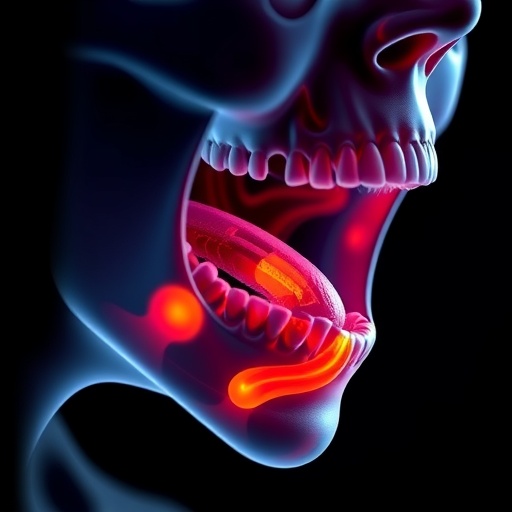In a groundbreaking study recently published in the Journal of Translational Medicine, researchers have made significant strides in the field of oncology by developing a highly sophisticated cancer metastasis-associated risk model. The work is spearheaded by Han et al., who employed an array of multi-machine-learning algorithms aimed at enhancing prognostic risk evaluation specifically for oral squamous cell carcinoma (OSCC). This remarkable advancement could very well reshape clinical practices and patient management strategies in the realm of head and neck cancers.
Oral squamous cell carcinoma is notoriously aggressive and known for its propensity to metastasize, leading to poor prognoses and limited treatment options for patients. The complexities involved in predicting the behavior of this malignancy have long hindered clinicians’ abilities to tailor effective therapies for individual patients. However, the research team led by X. Han has utilized advanced machine learning methodologies to analyze extensive datasets, enabling the identification of crucial patterns and factors that influence metastasis.
The study’s methodology involved the integration of diverse machine learning algorithms, each contributing uniquely to the overall model’s efficacy. By synthesizing insights from various approaches, the researchers aimed to create a robust and reliable predictive tool. From random forests to support vector machines, a comprehensive suite of analytical techniques was employed, allowing the team to leverage the strengths of each algorithm while minimizing individual weaknesses.
Through meticulous data collection, including clinical, genomic, and imaging information from patients diagnosed with OSCC, the team generated an extensive dataset that fueled their machine learning processes. This holistic approach not only provided depth to their analysis but also reinforced the model’s validity across different patient demographics and treatment regimens. The result was a predictive model that not only assessed the risk of metastasis but also proposed tailored treatment strategies based on individual patient profiles.
One of the standout features of the developed risk model is its ability to deliver real-time prognostic assessments. This feature could revolutionize clinical decision-making, allowing oncologists to provide personalized care plans while proactively addressing the challenges posed by metastasis. Early detection of high-risk patients through this model could lead to timely interventions, potentially improving survival rates in an area of medicine where delays can be perilous.
Moreover, the implications of this research extend beyond immediate patient care. By providing a framework for understanding the mechanisms underlying metastasis in OSCC, the model opens avenues for further research into therapeutic targets. This could lead to the development of new drugs aimed at combating the specific pathways identified as high-risk, setting the stage for more effective treatments in the future.
In addition to its clinical applications, the study emphasizes the role of interdisciplinary collaboration in advancing cancer research. The findings underscore the importance of combining expertise from various fields—including bioinformatics, machine learning, and clinical oncology—to address complex health issues in innovative ways. This collaborative approach not only enhances the quality of research but also fosters an environment conducive to breakthroughs that could save lives.
As the research team prepares for potential clinical trials based on their findings, the excitement within the scientific community is palpable. Medical professionals and researchers alike are eagerly anticipating the potential of this model to change the landscape of patient management in oral squamous cell carcinoma. The prospect of utilizing AI and machine learning in such a critical field highlights the relentless drive towards integrating technology with healthcare.
Furthermore, the study highlights the need for continuous refinement of machine learning models, underscoring that as more data becomes available, the algorithms can be fine-tuned to improve accuracy and predictive power. This iterative process is crucial, as it ensures that the model remains responsive to emerging trends in cancer treatment and patient outcomes.
Given the prevalence of oral squamous cell carcinoma in certain demographics, the potential for widespread impact is immense. As incidence rates continue to rise, particularly in populations with high tobacco and alcohol use, a predictive model offering superior risk assessment and management strategies could prove invaluable. The forthcoming clinical applications of this research could place it on the forefront of transformative cancer care.
Equally important is the ethical dimension of employing machine learning in healthcare. The researchers have meticulously considered the implications of their model to ensure transparency and fairness in its application. Efforts have been made to minimize biases that could skew results and adversely affect patient outcomes. This vigilance is paramount in maintaining trust in AI-driven healthcare solutions.
In conclusion, the research undertaken by Han and colleagues signifies a pivotal step forward in the fight against oral squamous cell carcinoma. By harnessing the power of machine learning, they have created a unique risk model that promises to enhance prognostic evaluations and clinical decision-making. The potential to improve patient outcomes in such a challenging cancer underscores the importance of innovation in medical research. As the scientific community eagerly awaits further developments, the integration of technology in cancer treatment continues to offer hope in the relentless battle against this disease.
The future of oncology is being shaped today, and with studies like this one, there is renewed optimism for better patient management strategies, customized treatment plans, and ultimately, improved survival rates for those affected by OSCC.
Subject of Research: Cancer metastasis risk model for oral squamous cell carcinoma
Article Title: Development of a cancer metastasis-associated risk model via multi-machine-learning algorithms for prognostic risk evaluation and clinical application in oral squamous cell carcinoma.
Article References:
Han, X., Sun, T., Dai, Y. et al. Development of a cancer metastasis-associated risk model via multi-machine-learning algorithms for prognostic risk evaluation and clinical application in oral squamous cell carcinoma.
J Transl Med 23, 1344 (2025). https://doi.org/10.1186/s12967-025-07336-y
Image Credits: AI Generated
DOI: https://doi.org/10.1186/s12967-025-07336-y
Keywords: Oral squamous cell carcinoma, machine learning, risk model, metastasis, prognostic evaluation.




